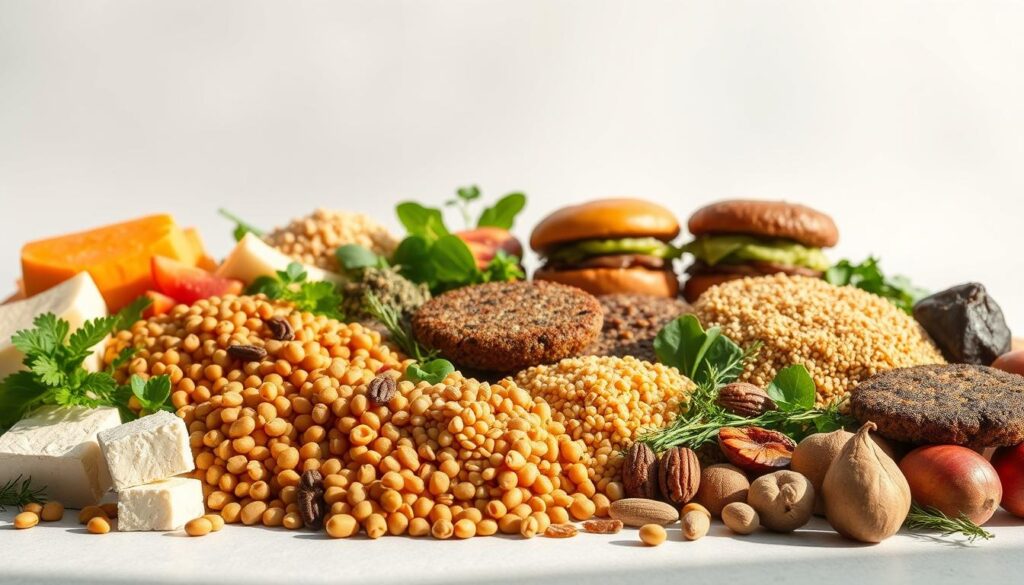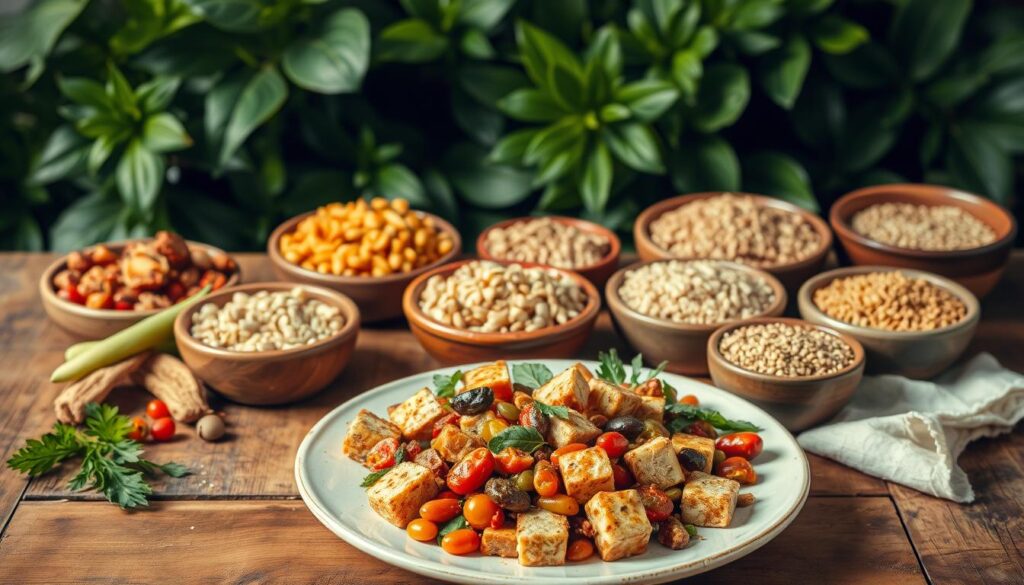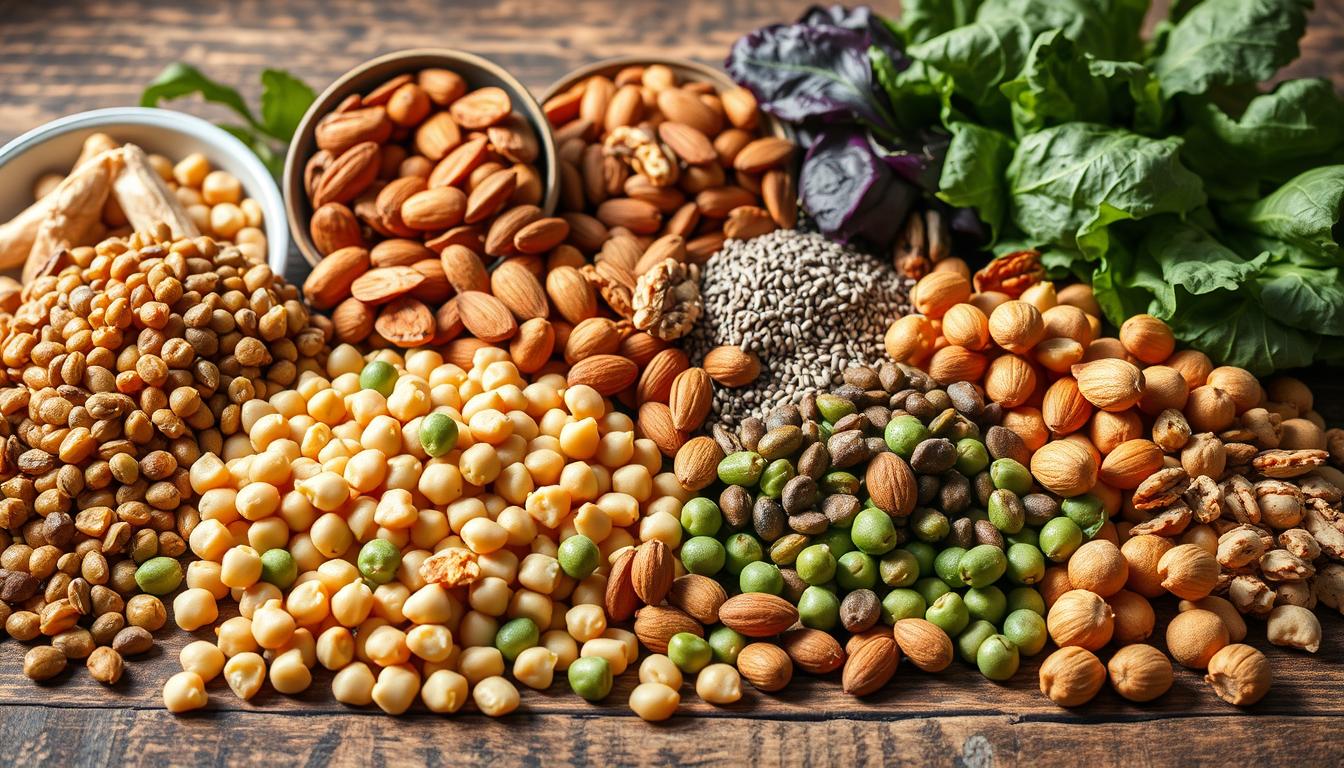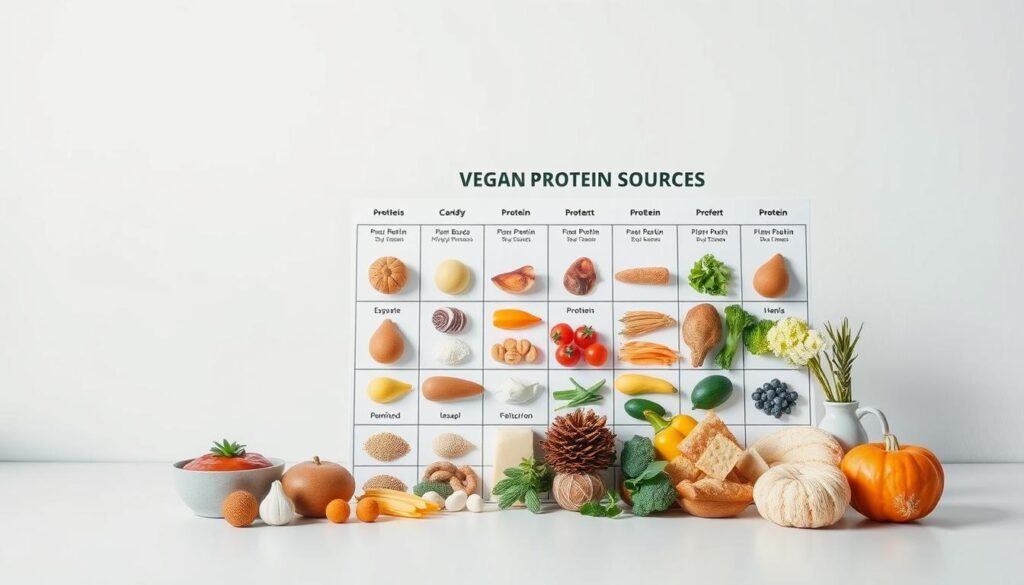Are you wondering if it’s possible to meet your protein needs on a vegan diet? Many believe that a vegan lifestyle lacks sufficient protein, but the truth is, there are numerous plant-based protein options available.
A well-planned vegan diet can provide all the necessary protein for optimal health. With a variety of vegan protein sources such as legumes, nuts, and whole grains, you can easily meet your daily protein requirements.
Embracing a vegan lifestyle doesn’t mean compromising on protein intake. By incorporating a mix of different plant-based foods, you can ensure you’re getting enough protein.
Key Takeaways
Table of Contents
- Legumes are a high-protein food option for vegans.
- Nuts and seeds provide a boost of protein in a vegan diet.
- Whole grains are another excellent source of protein.
- A varied vegan diet ensures adequate protein intake.
- Plant-based protein powders can be a convenient supplement.
The Importance of Protein in a Vegan Diet
In a vegan diet, protein is a key component that supports numerous health benefits, from energy production to immune function. As emphasized by a study published in the Journal of the American Osteopathic Association, “protein is an essential nutrient for maintaining overall health and well-being.”
Why Protein Matters for Overall Health
Protein is crucial for building and repairing tissues in the body, including muscles, bones, and skin. It also plays a vital role in producing enzymes, hormones, and other biomolecules essential for various bodily functions. A diet rich in protein can help support overall health, including weight management and immune function.
Protein Requirements Based on Activity Level
Protein requirements vary based on an individual’s activity level. For instance, athletes or those who engage in regular physical activity may require more protein to support muscle repair and growth. The general recommendation is about 0.8 grams of protein per kilogram of body weight per day for sedentary individuals, but this can increase to 1.2-1.6 grams or more for active individuals.
Signs of Inadequate Protein Intake
Inadequate protein intake can lead to various health issues, including fatigue, weakness, and poor wound healing. Vegans should be aware of these signs and ensure they are consuming enough protein-rich foods or supplements to meet their daily needs.
By understanding the importance of protein and how to meet protein needs, vegans can maintain a healthy and balanced diet. Incorporating a variety of protein-rich vegan foods and being mindful of overall protein intake can help support overall health and well-being.
Common Myths About Vegan Protein
The notion that vegans struggle to get enough protein is a common misconception that needs to be debunked. Many believe that a vegan diet is inherently protein-deficient, but this couldn’t be further from the truth.
Debunking the “Protein Deficiency” Concern
Numerous vegan protein sources are available, including legumes, nuts, seeds, and whole grains. A well-planned vegan diet can provide all the necessary protein for optimal health. As noted by a study, “a well-planned vegan diet is rich in nutrients and low in saturated fat,” supporting overall health.
Quality of Plant vs. Animal Proteins
While some argue that animal proteins are superior, plant-based proteins offer numerous benefits, including lower saturated fat content and higher fiber. “Plant-based diets are associated with a reduced risk of chronic diseases,” as highlighted in various nutritional studies.
The “Incomplete Protein” Misconception
The idea that plant proteins are incomplete is a myth. All plant foods contain all 20 amino acids, and a varied diet ensures that vegans get all the essential amino acids. By incorporating a range of high protein vegan meals, individuals can easily meet their protein needs.
By understanding how to get enough protein on a vegan diet, individuals can confidently adopt a plant-based lifestyle, reaping its numerous health benefits.
How to Get Enough Protein on a Vegan Diet
A well-planned vegan diet can provide all the necessary protein for optimal health. Understanding the basics of protein nutrition is key to achieving this.
Understanding Complete and Incomplete Proteins
Proteins are made up of amino acids, some of which the body cannot produce on its own. These are known as essential amino acids. Complete proteins contain all nine essential amino acids, while incomplete proteins lack one or more of these amino acids. Most plant-based foods are incomplete proteins, but there are exceptions like quinoa and chia seeds.
Protein Combining Strategies
The idea of combining proteins to achieve a complete amino acid profile has been around for decades. However, current research suggests that the body can combine amino acids from various foods consumed throughout the day, making it unnecessary to pair foods at every meal. Examples of protein-rich foods that can be combined include legumes with grains or nuts with seeds.
Daily Protein Goals for Vegans
Determining daily protein needs depends on factors such as weight, activity level, and overall health goals. For vegans, the recommended daily intake is slightly higher than for non-vegans due to differences in protein digestibility.
Calculation Methods Based on Weight and Activity
A general guideline for protein intake is 0.8 grams per kilogram of body weight for sedentary individuals, increasing to 1.2-1.6 grams or more per kilogram for active individuals or athletes. For example, a 150-pound (68 kg) person who is moderately active might aim for about 1.2 grams of protein per kilogram, translating to approximately 82 grams of protein per day.
Tracking Your Protein Intake
To ensure you’re meeting your protein needs, keeping a food diary or using a nutrition app can be helpful. Many apps allow you to track your daily protein intake and provide insights into your diet.
By understanding your protein needs and incorporating a variety of plant-based protein options into your diet, you can easily meet your daily protein goals. Whether through vegan protein recipes or simply including protein-rich vegan foods in your meals, maintaining a balanced diet is achievable and beneficial for overall health.
Top Plant-Based Protein Sources
A well-planned vegan diet includes a variety of plant-based protein sources that can meet all your nutritional needs. These sources are not only rich in protein but also provide other essential nutrients.
Legumes (Beans, Lentils, Chickpeas)
Legumes are among the highest protein-containing foods in a vegan diet. They are versatile and can be used in a variety of dishes, from soups to salads.
Protein Content and Preparation Tips
Legumes are rich in protein and fiber, making them very filling. For example, lentils contain about 18g of protein per cooked cup, while chickpeas offer around 15g per cup. To incorporate legumes into your diet, try making a hearty lentil soup or a chickpea salad.
Tofu, Tempeh, and Other Soy Products
Soy products are excellent sources of protein and can be easily incorporated into meals. Tofu, tempeh, and edamame are popular choices among vegans.
Nutritional Benefits Beyond Protein
Besides being high in protein, soy products are rich in iron and calcium. Tempeh, for instance, is fermented, which makes it a good source of probiotics that support gut health.

Nuts, Seeds, and Their Butters
Nuts and seeds are not only great sources of healthy fats but also provide a good amount of protein. They make for excellent snacks or additions to meals.
Highest Protein Options
Some of the highest protein nuts and seeds include almonds, pumpkin seeds, and chia seeds. For example, almonds contain about 6g of protein per ounce, while chia seeds offer around 5g per ounce.
Whole Grains and Pseudocereals
Whole grains and pseudocereals like quinoa and amaranth are not only rich in protein but also provide other essential nutrients like fiber and minerals.
Quinoa, Amaranth, and Other Protein-Rich Grains
Quinoa is a complete protein, meaning it contains all nine essential amino acids. It provides about 8g of protein per cooked cup. Amaranth is another pseudocereal that is high in protein, offering around 9g per cooked cup.
By incorporating these high protein vegan meals and foods into your diet, you can easily meet your protein needs and enjoy the vegan protein benefits.
Creating Balanced High-Protein Vegan Meals
With a little creativity, you can create balanced, high-protein vegan meals that are both satisfying and nutritious. Planning your meals around a variety of protein-rich vegan foods ensures you meet your daily protein needs.
Breakfast Ideas
Starting your day with a protein-packed breakfast sets a positive tone for your dietary goals. Consider options like tofu scrambles with spinach and whole-grain toast or a smoothie bowl made with protein-rich pea milk, frozen berries, and almond butter topped with chia seeds.
Quick and Protein-Packed Morning Options
For busy mornings, prepare overnight oats with soy milk, chia seeds, and nuts, or grab a protein bar made from wholesome, vegan ingredients. These quick and easy choices keep you fueled and focused.
Lunch and Dinner Options
For lunch and dinner, one-pot meals can be a lifesaver, offering convenience without sacrificing nutrition. Try a hearty lentil stew with kale and quinoa or a stir-fry with tofu, mixed vegetables, and brown rice.
One-Pot High-Protein Meals
One-pot wonders like chickpea and spinach curry served with whole-grain naan or a vegan chili with beans and quinoa are not only delicious but also packed with protein. These meals are perfect for meal prep, ensuring you have healthy, high protein vegan meals ready throughout the week.
Snacks and On-the-Go Solutions
Snacking is an essential part of maintaining energy levels, especially when following a vegan diet. Opt for protein-rich snacks like edamame, trail mix with nuts and seeds, or energy balls made from oats, nut butter, and chia seeds.
No-Cook Protein Snacks
No-cook snacks are ideal for busy days. Enjoy apple slices with almond butter, a handful of roasted chickpeas seasoned with your favorite spices, or a protein-rich energy bar. These snacks are not only convenient but also contribute to your overall protein intake.
By incorporating these ideas into your meal planning, you can enjoy a varied and protein-rich vegan diet. Whether you’re at home or on the go, there are countless ways to meet your protein needs with delicious, plant-based foods.
Special Considerations for Higher Protein Needs
Certain groups, including pregnant women and older adults, have higher protein requirements that must be met through a well-planned vegan diet. Ensuring adequate protein intake is crucial for overall health, particularly for these individuals.
Vegan Athletes and Bodybuilders
Vegan athletes and bodybuilders require more protein to support muscle growth and repair. Protein supplements for vegans can be a convenient option, but whole food sources should also be emphasized. Legumes, tofu, and tempeh are excellent choices.
Pregnancy and Breastfeeding
During pregnancy and breastfeeding, women have higher protein needs to support the health of both mother and baby. Including protein-rich foods like lentils, chickpeas, and seitan can help meet these needs.
Older Adults and Protein Requirements
Older adults require more protein to maintain muscle mass and overall health. Vegan protein sources like nuts, seeds, and whole grains are beneficial. A well-planned diet can help prevent muscle loss.
Weight Loss and Higher Protein Intake
A higher protein diet can support weight loss by promoting satiety and preserving muscle mass. Vegan protein-rich foods like tofu, tempeh, and legumes are effective choices for those looking to lose weight.
| Group | Protein Needs | Recommended Foods |
|---|---|---|
| Vegan Athletes | Higher | Legumes, Tofu, Tempeh |
| Pregnant/Breastfeeding Women | Higher | Lentils, Chickpeas, Seitan |
| Older Adults | Higher | Nuts, Seeds, Whole Grains |
| Weight Loss | Higher | Tofu, Tempeh, Legumes |

Conclusion
A well-planned vegan diet can provide all the necessary protein for optimal health. By incorporating a variety of vegan protein sources into your meals, you can easily meet your daily protein needs. From legumes and soy products to nuts, seeds, and whole grains, there are numerous plant-based protein options to choose from.
Experimenting with different vegan protein recipes can help keep your diet interesting and ensure you’re getting enough protein. Whether you’re a seasoned vegan or just starting out, there’s a wealth of delicious and nutritious options available. By making informed choices and being mindful of your protein intake, you can thrive on a vegan diet.
With the knowledge and inspiration gained from this article, you’re now ready to take your vegan lifestyle to the next level. Enjoy exploring the world of plant-based protein and discover the many benefits it has to offer.
FAQ
What are some high protein vegan foods?
High protein vegan foods include legumes like lentils and chickpeas, soy products like tofu and tempeh, nuts and seeds like almonds and chia seeds, and whole grains like quinoa and amaranth.
How can I get enough protein on a vegan diet?
To get enough protein on a vegan diet, focus on consuming a variety of plant-based protein sources, including legumes, soy products, nuts, and seeds. You can also consider plant-based protein powders as a supplement.
What is the difference between complete and incomplete proteins?
Complete proteins contain all nine essential amino acids that the body cannot produce on its own, while incomplete proteins lack one or more of these amino acids. Examples of complete proteins include quinoa and chia seeds, while examples of incomplete proteins include beans and lentils.
Do I need to combine protein sources at every meal?
No, you don’t need to combine protein sources at every meal. As long as you are consuming a variety of protein-rich foods throughout the day, you can meet your protein needs without carefully planning every meal.
How much protein do I need on a vegan diet?
The daily protein needs for vegans vary based on factors like age, weight, and activity level. Generally, the recommended daily intake is around 0.8-1 gram of protein per kilogram of body weight.
Can I get too much protein on a vegan diet?
Yes, it is possible to consume too much protein on a vegan diet. Excessive protein intake can put a strain on the kidneys and liver, so it’s essential to be mindful of your overall protein intake.
Are there any vegan protein supplements available?
Yes, there are many vegan protein supplements available, including pea protein, hemp protein, and brown rice protein powders. These can be a convenient way to boost your protein intake, especially for athletes or individuals with high protein needs.
Can a well-planned vegan diet provide all the necessary protein?
Yes, a well-planned vegan diet that includes a variety of protein-rich foods can provide all the necessary protein for optimal health.

